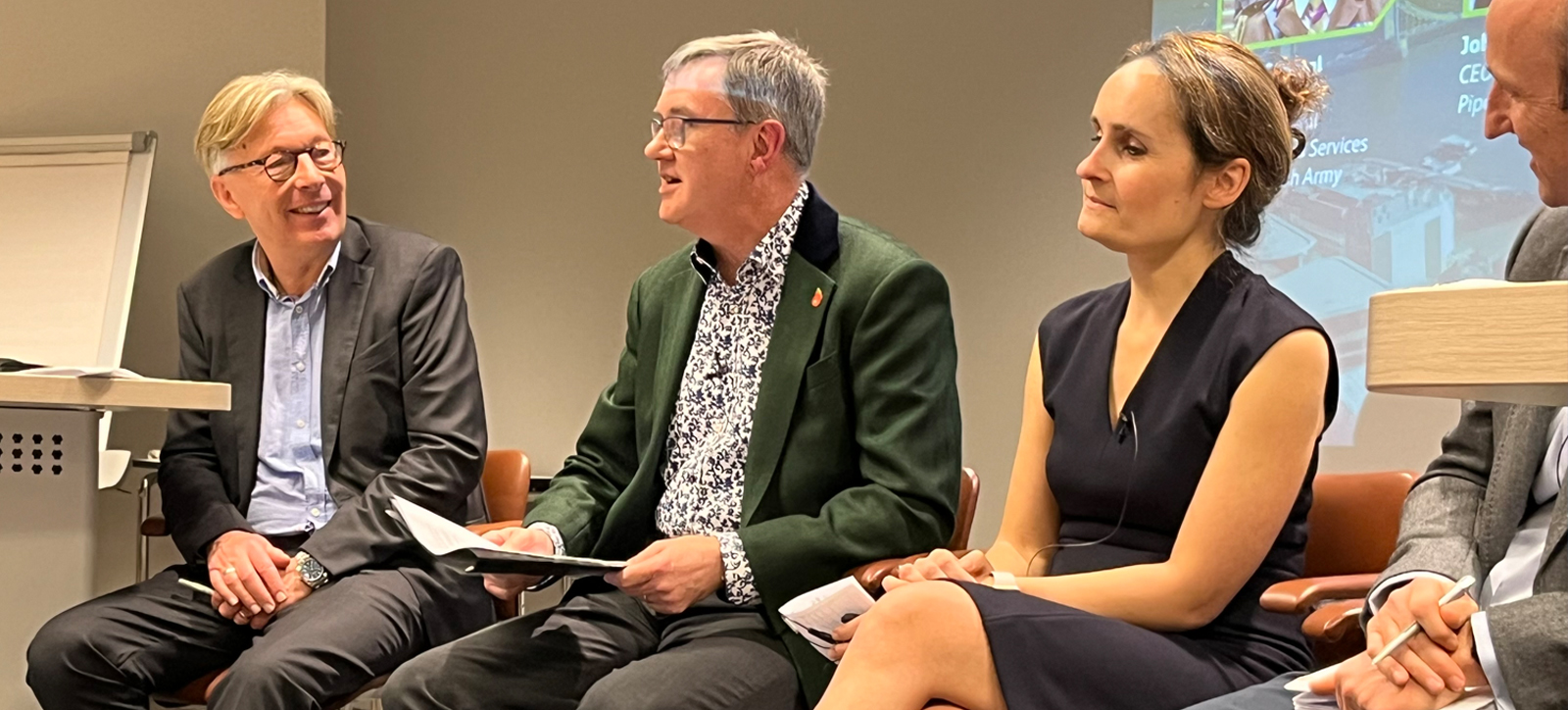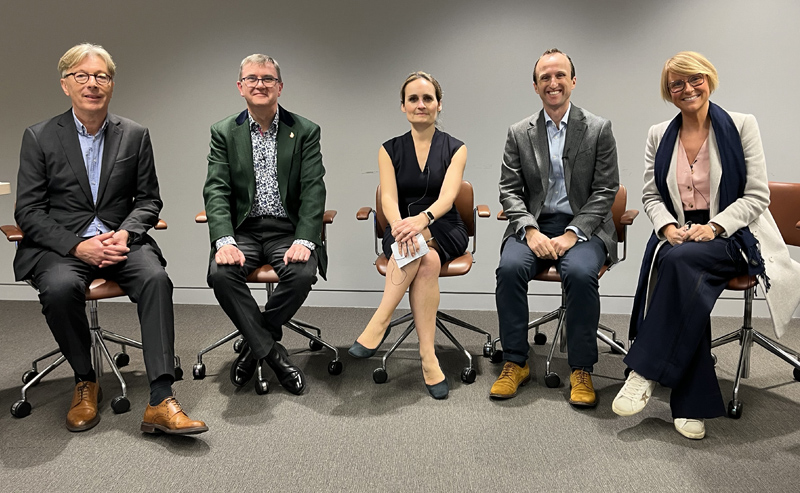
Expert opinion: Major General Tim Hodgetts (second on the left) has managed major crises like the ebola epidemic in Sierra Leona
NATO’s Chief Medical Officer and former Surgeon-General of Britain’s Armed Forces Major General Tim Hodgetts CB CBE told a packed WBS London at The Shard: “In a crisis you sink to your level of training.”
General Hodgetts was speaking at the Leading and Innovating in Challenging Times panel discussion alongside John Armstrong, CEO of British Pipeline Agency Limited, Penny Kechagioglou, Consultant Clinical Oncologist and Deputy Chief Medical Officer at University Hospitals Coventry and Warwickshire, and Kate Davidson, President of the Federation of Burial and Cremation Authorities (FBCA), with John Colley, Professor of Practice in Strategy and Leadership and a former Group Managing Director at a FTSE 100 business, as chair.
“Crises are usually unpredictable, but that doesn’t mean you can’t plan for them,” said General Hodgetts, who has 43 years of experience of dealing with medical emergencies in the Army and has been involved in numerous disaster responses. “You can have a plan, but if you don’t read it or exercise it, it is absolutely pointless.
“Also, no plan withstands first contact with the enemy. Thus, you need a generic approach to planning that can be adapted to any incident.
“In a crisis, you do not rise to the occasion; you sink to your level of training.”
General Hodgetts emphasised the importance of building relationships before a crisis occurs, noting that it is much easier to manage a crisis when people know each other and have trained together.
Mr Armstrong, who has extensive experience in the energy industry and has managed crises internationally, including industrial accidents and protests, echoed General Hodgetts’ sentiments.
“When a crisis comes, at first nobody reaches for the plan, that tends to come later” he said. “The reality is that you need an organisation that has trained the crisis management muscle across the whole business and not just rely on one or two people.”

A major crisis for many organisations was the COVID-19 pandemic, and none more so than the already over-stretched UK National Health Service (NHS).
Dr Kechagioglou’s NHS trust was the first in the world to deliver the COVID-19 vaccination and feels there are lessons to be learned from how quick and adaptable organisations were during the pandemic.
“We saw how partnerships and collaboration can make a difference,” she said.
“We gave people on the frontline the power to make change, and showed empathy, supporting staff and patients, something we should never lose during a crisis.”
Ms Davidson was awarded an MBE for her work with bereaved families during the pandemic when she was CEO of funeral directors Westerleigh Group. Despite the myriad restrictions she led Westerleigh with great empathy to still deliver 50,000 services a year.
Reflecting on her experiences during the pandemic, she noted how quickly organisations revert back to how they operated before.
“It’s amazing how quickly we have forgotten how much we learned in COVID,” she said. “In board meetings, we question if we need to spend time doing a business continuity plan. It’s not about having a lever arch folder full with a plan but having people ready and getting them together regularly to go through what we need to do.”
Dr Kechagioglou added: “The NHS does have crisis plans and is very good at post-mortems, but we don’t bring people together for pre-mortems, we need to look at what could go wrong in any big change we are introducing before it happens.”
The panelists also discussed the psychological toll of managing crises.
“They are emotionally tiring and wear you down,” said General Hodgetts, who has faced some of the most challenging crises of our time, from the IRA Musgrave Park Hospital bombing in 1991 to the Ebola epidemic in Sierra Leone. “You have to be determined to implement change and take considered risk during crisis, as there will be many who find reason to oppose change during uncertainty.”
He shared his personal coping mechanism of writing poetry during high-stress situations, which he finds therapeutic.
Mr Armstrong argued that crises can bring out the best in people, but they also require a lot of energy.
“When a crisis hits, there is an energy to it, but it’s amazing how quickly everyone gets tired out,” he said and emphasised the importance of having a resilient team that can sustain the effort required during prolonged crises.
Professor Colley, who co-authored Unprecedented Leadership: Learning to Lead in Turbulent Times, pointed out the importance of putting the right people together to prepare for a crisis - and it is not usually the CEO.
“You need the right people in the room very often, as they will be the ones who solve the crisis, not you,” he said.
“Also, there are always opportunities in a crisis; it is just finding them. A crisis can help bring change to an organisation. They need to be seized on to drive change as strangely an organisation and its people can quickly degenerate back into their usual bureaucracy.”
Miss Davidson agreed and added: “There are commercial opportunities in crises. I was so focused on managing the crisis and looking after our staff, I did not have time to step back and think commercially.
“I only realised a few weeks into it that there were opportunities. The challenge is creating the time to do this, perhaps you should hand over comms to someone else so you can examine them properly.”
General Hodgetts, who has written 37 books and around 150 academic journal papers that include managing crises, added: “There is something to learn from every crisis and my great joy has been seeing the lessons I have taken from these extreme situations being employed more widely – you should never waste the opportunity from a crisis.”
Discover more about how our courses can address your leadership challenges.
And discover more about our Change Makers at Warwick Business School.




 X
X Facebook
Facebook LinkedIn
LinkedIn YouTube
YouTube Instagram
Instagram Tiktok
Tiktok